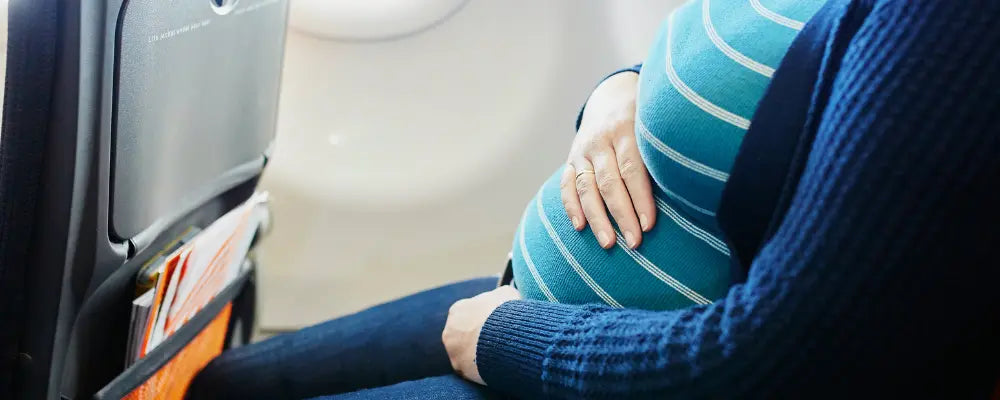Pregnancy is a time of wonder and anticipation, but it also comes with its share of concerns, especially when it comes to travel during pregnancy. While many women experience a healthy pregnancy without complications, it's essential to prioritise safety and comfort when planning a trip.
Before embarking on any journey, consulting with your healthcare provider is crucial. They can assess your individual health condition, provide personalised recommendations, and address any concerns you may have. You can enjoy a safe and memorable travel experience by following their guidance and taking necessary precautions. With this article by Care for Child, let's explore the key factors to consider when planning a trip during pregnancy and answer all your questions in case you are wondering if it is safe to travel during pregnancy.
Travelling During Different Trimesters
Each trimester of pregnancy brings unique challenges and considerations when it comes to travel. Understanding the specific needs of each stage will help you plan a safe and enjoyable journey for a plan to travel during pregnancy.
- First Trimester Travel: The first trimester is often marked by fatigue, morning sickness, and increased sensitivity. So, is travelling safe during early pregnancy? While it's generally safe to travel during this period, listening to your body and prioritising comfort is essential. Here are some things you will need to know for travelling during 1st month of pregnancy and the first trimester of pregnancy.
- Consult your doctor before making travel plans.
- Choose shorter trips and avoid long-haul flights.
- Pack essential medications and snacks.
- Be prepared for potential discomforts like nausea or fatigue.
- Second Trimester Travel: The second trimester is often considered the "golden period" of pregnancy, with reduced fatigue and morning sickness. Many women find this trimester more comfortable for travel.
- Enjoy increased energy levels and reduced discomfort.
- Consider longer trips if desired.
- Continue to stay hydrated and take breaks during travel.
- Pack maternity wear for comfort.
- Third Trimester Travel: As your due date approaches, travel becomes more restricted. It's essential to consult your doctor and prioritise safety.
- Obtain medical clearance for travel.
- Pack essential items, including a hospital bag.
- Choose destinations with accessible healthcare facilities.
- Be prepared for potential early labour or other complications.
These are just general guidelines, and individual experiences may vary. Always consult your healthcare provider for personalised advice for travel during pregnancy based on your specific health condition.
Travel Tips During Pregnancy
Choosing the right mode of transport, packing essential items, and prioritising comfort is key to a pleasant travel experience during pregnancy. Here are some travel tips during pregnancy that you will need to consider.
- Choosing the Suitable Mode of Transport: Pregnancy Travel Tips
- Air travel: Opt for larger aircraft with more legroom. Inform the airline about your pregnancy for assistance.
- Car travel: Take frequent breaks to stretch your legs and hydrate. Use a comfortable seat cushion for support.
- Train travel: Choose trains with comfortable seating and ample legroom.
- Bus travel: Avoid long-distance bus journeys, as they can be uncomfortable.
- Packing Essentials for the Journey: Pregnancy Travel Tips
- Comfortable clothing and footwear.
- Maternity wear for changing body shape.
- Essential medications and prenatal vitamins.
- Snacks and water to stay hydrated.
- Entertainment options like books, magazines, or headphones.
- Pregnancy-specific items like compression socks or a pregnancy pillow.
- Staying Comfortable and Healthy During Travel: Pregnancy Travel Tips
- Dress in layers to adjust to temperature changes.
- Get up and move around regularly to prevent stiffness and swelling.
- Stay hydrated by drinking plenty of water.
- Avoid excessive caffeine and alcohol.
- Take short naps if possible.
- Handling Common Discomforts: Pregnancy Travel Tips
- Pack motion sickness medication if needed.
- Use compression socks to alleviate swelling.
- Bring along snacks to manage hunger cravings.
- Rest and elevate your legs when possible.
Safety Precautions
Prioritising safety during pregnancy travel is essential for peace of mind. By taking proactive measures and considering potential risks, you can confidently enjoy your journey.
Travel Insurance for Added Peace of Mind
Investing in travel insurance specifically designed for pregnant women is highly recommended. This coverage can provide financial protection in case of unexpected medical emergencies or trip cancellations.
- Benefits of travel insurance:
- Covers medical expenses related to pregnancy complications.
- Provides reimbursement for trip cancellations or interruptions.
- Offers assistance with travel arrangements and accommodations.
- Offers peace of mind and allows you to focus on enjoying your trip.
Choosing Safe Destinations
Researching your destination is crucial to ensure a safe and comfortable travel experience. Consider the following factors when selecting your destination:
- Healthcare facilities: Choose destinations with accessible and reputable healthcare facilities in case of emergencies.
- Climate: Opt for destinations with a climate similar to your home to minimise discomfort.
- Activities: Select destinations that offer low-impact activities suitable for pregnant women.
- Security: Research the safety and security measures in place at your chosen destination.
By carefully selecting your destination, you can reduce potential risks and enjoy a more relaxed trip.
Avoiding High-Risk Activities
While travelling during pregnancy, avoiding activities that could pose a risk to you or your baby is essential. Some activities to avoid include:
- High-altitude travel: Consult your doctor about the risks associated with high-altitude travel, especially during the third trimester.
- Extreme sports and adventure activities: Avoid activities that involve physical exertion or potential falls.
- Unhygienic conditions: Practice good hygiene and avoid contaminated food or water exposure.
- Long periods of inactivity: Take breaks during travel to stretch your legs and prevent discomfort.
By prioritising safety and avoiding high-risk activities, you can enjoy a worry-free travel experience.
In Conclusion
Travelling during pregnancy can be a wonderful experience but requires careful planning and consideration. By prioritising safety, comfort, and health, you can create lasting memories while ensuring your and your baby's well-being. Remember to consult with your healthcare provider before any travel plans to get personalised advice based on your specific pregnancy. You can embark on a safe and enjoyable journey with proper planning and preparation. Safe travels!

